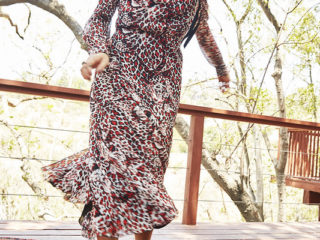I grew up hearing the message to expect the worst. This way when things didn’t go as I had hoped, I would not be disappointed. Although well-intentioned, this advice failed miserably. In reality, I was disappointed but I felt even worse because there was this expectation to get over it quickly and move on.
I see how this message permeates the lives of so many of my friends, clients and coworkers trying to bypass disappointment. So much so that it has become toxic. One of life’s realities is that we are not always going to get what we want. This is not a bad thing. Yet, when we downplay our desires, hopes and dreams, we are living a small life.
When we downplay our desires, hopes and dreams, we are playing small and living a small life.
So I am all in when I am going for something. No more saying one thing on the surface and feeling the opposite of what I portray to the world.
Sure it stings. Sometimes it knocks the wind out of me and takes days to recover and recalibrate. Being all in and befriending disappointment means I am living a brave life. It challenges me to be true to myself while also being honest with those around me.
Being all in and befriending disappointment means I am living a brave life.
The Impact of Unaddressed Disappointment Throughout Time
Stuffing, minimizing and denying disappointment only does harm to our wellbeing. Unaddressed disappointment impacts relationships because you show up outside of your integrity and honesty by pretending disappointment does not matter to you.
Not owning the hurts attached to our disappointments also sends a message to others to do the same. It is a missed opportunity to model courage, which can be contagious.
Bypassing disappointment also impacts your emotional wellbeing and your mood, potentially causing more anxiety, depression and lessening your self-worth. It also impacts your physical well-being. The papercuts of stuffed disappointments can add up and become physical burdens that impact your ability to sleep, eat and feel comfortable in your skin.
Without building the emotional muscle to feel through the hurts of disappointments, our bodies do not believe we can handle it and see a small sting as a much bigger threat than it really is. Thus, our bodies brace for the hit of disappointment as if a car crash is about to happen. When all disappointment is perceived as dangerous, the stress on the body can take a toll and trigger a myriad of physical issues.
Avoiding Disappointment = Avoiding Risk
When we try and engineer a life that is disappointment-free, we are attempting to avoid risk. Because disappointments can be so painful, it makes sense that we try to avoid them, consciously or unconsciously. Our nervous system is all about safety, certainty and avoiding risk.
Yet, safety and certainty are in direct conflict with a life of love, adventure, faith, courage and community—all the things that make us feel alive and connected to meaning and purpose. These are essential components to our overall health.
Safety and certainty are in direct conflict with a life of love, adventure, faith, courage and community
When humans are involved, we need to adjust our expectations and look at disappointment as something that is always an option. It is part of the deal of going into the unknown of life. Cultivating a risk-averse life is not a life well-lived or well-loved.
Responding to Disappointment
What do you do when the possibility of disappointment shows up? Because it is always a possibility, make sure to practice the following and remember that the power of a disappointment loses its strength on the other side of rising from it. Going through disappointment is a hard but important practice that builds resilience and trust in yourself.
Going through disappointment is a hard but important practice that builds resilience and trust in yourself.
- Take inventory of your fears around disappointments.
Look at each of these fears and note your ability to move through them. We are all often stronger than we give ourselves credit for. Also, check and see which fears keep you living a small life and which ones come from a place of wisdom. Adjust accordingly. - Check where you may be feeling entitled to something or deserving.
These beliefs can often set us up for disappointments and further frustrations. - Remind yourself to not go it alone.
Invite a trusted friend or loved one into your hurts and hopes. Giving witness to your truth is a powerful practice to living an expansive life. - Do not plan for the worst but take a neutral posture around all possibilities.
Look at every option and acknowledge you chose to not shrink and play it small. - Check your expectations of yourself and others.
Do you need to adjust them to be more aligned with information you have collected in the past? Are you repeating an expectation that consistently leads to disappointment? - Set boundaries.
What boundaries need to be put in place or reinforced? If you are starting to feel bitterness or resentment, then that is a warning flag that a boundary is not being respected or is needed.
Have you ever been faced with crushing disappointment? How have you learned to process it?
Image via Emma Blockute












2 comments
Hello, Charmaine! Thanks again for reading. 🙂
I’ve always tried to avoid feeling disappointed – and like you said, it means avoiding taking risks. Thanks for this post – really opened my eyes to my own bad habits! 🙂
–
Charmaine Ng | Architecture & Lifestyle Blog
https://charmainenyw.com